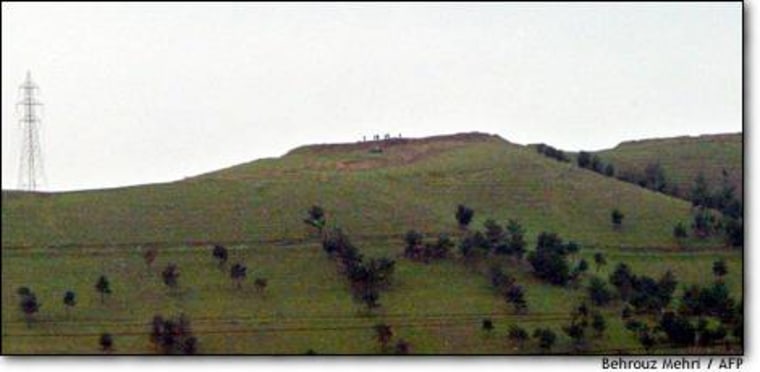The vigorous resistance to the U.S. military invasion of southern Iraq may be galvanizing Saddam Hussein’s troops in the north, causing concern among the Iraqi opposition that a slower-than-expected U.S. march toward Baghdad will embolden tens of thousands of Iraqi forces who have yet to be conquered, officials said.
In several interviews, Kurdish security officials said that, while they are not losing confidence in America’s ability to defeat the Iraqi military, they are worried that the heavy concentration of U.S. ground and air power on Baghdad and targets in the south is sapping the spirit of pro-American Iraqis in the north who believed they would see U.S. troops sooner.
The Kurdish officials also worry that Iraqi troops in the north hearing reports of their comrades putting up stiffer-than-expected resistance around Basra, a key southern city, could be motivated to fight harder.
On Sunday, Lt. Gen. John Abizaid, deputy head of the U.S. Central Command, described one tough battle in the south as a “sharp engagement,” echoing statements by other U.S. commanders that at least some Iraqi troops were resisting strongly.
Several obstacles have slowed the U.S. military invasion of northern Iraq, primarily Turkey’s refusal to allow U.S. troops to move through that country into Iraq. In the last few weeks, Pentagon commanders have had to abandon plans for a ground invasion from the north and replace them with a much riskier airborne assault.
U.S. special forces are already operating in northern Iraq, laying the groundwork for a large-scale airdrop of thousands of U.S. troops, including the 173rd Airborne Brigade, which has arrived in the Kurdish-controlled north, according to U.S. officials. But airborne troops would be fewer in number and more lightly armed than a land-based force, making any attack more difficult, a risk that could explain the Pentagon’s slower pace in northern Iraq.
STRONG FIGHT EXPECTED
The Iraqi opposition officials, who spoke on condition of anonymity, said intelligence gathered from Saddam’s side suggested that the Iraqi leader’s northern troops will put up a strong fight in the absence of an early, robust U.S. military assault.
Last week, according to one Kurdish official, Iraqi troops in Kirkuk, an oil-rich northern city vital to the country’s post-war reconstruction, filled two lines of trenches surrounding the city with oil. They are expected to set the oil on fire when U.S. troops approach, the official said.
Another official, in charge of intelligence along the Kurdish-Iraqi front line, said the limited U.S. bombing of targets around Kirkuk had resulted in few, if any, deaths of Iraqi soldiers. The military sites hit by U.S. cruise missiles and smart bombs, the official said, were “deserted long before the U.S. bombs fell.”
“In my opinion, they should have done all this simultaneously,” he said. “They’re just hitting here and there,” he said of the sporadic air attacks in the north. Saddam is believed to have at least one elite Republican Guard division near Kirkuk, in addition to about 10 regular army divisions. Together, the divisions could total more than 100,000 soldiers.
Both officials pointed to the regular shelling by the Iraqis of areas near Chamchamal, a town on the front line between Iraqi forces and Kurdish opposition troops. While the shelling has fallen short of Chamchamal’s populated areas, the Iraqis appear to be using it to calibrate their weapons, improving their accuracy in the event of a U.S.-led attack. The timing of the weapons’ testing is brazen, said both officials, who are familiar with Iraqi tactics after years fighting Saddam’s forces. “They are sending us a message that they are still there,” one officials said.
POLITICAL GAIN
An opposition commander in Chamchamal also pointed to video of captured and killed American soldiers broadcast on Iraqi TV and the pan-Arabic satellite news channel Al-Jazeera, which he said could boost morale among Saddam’s lower-ranking forces.
The appearance of Saddam on Iraqi TV Monday will also rally the troops, the commander said. In a speech to the Iraqi nation, Saddam said his military was “causing the enemy to suffer and to lose every day.”
The commander said the mass desertions and surrenders by Iraqi troops, expected once the U.S. campaign began, have not materialized in the north. In the 1991 Gulf War, tens of thousands of Iraqi regulars surrendered en mass to Kurdish opposition forces.
“I really don’t understand the American policy,” the Iraqi opposition commander said. “We are losing momentum. It seems like a very chaotic tactic. The Iraqis will surrender, but you have to hit them hard.”
In coordination with American special forces operating in northern Iraq, the Kurdish opposition has set up several “processing centers” for surrendering Iraqi troops. But in the five days since the bombing began, no Iraqi deserters or surrendering forces have passed through the facilities, officials said.
(MSNBC.com’s Preston Mendenhall is on assignment in northern Iraq.)
